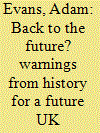|
|
|
Sort Order |
|
|
|
Items / Page
|
|
|
|
|
|
|
| Srl | Item |
| 1 |
ID:
138268


|
|
|
|
|
| Summary/Abstract |
Amid the fallout from the Scottish independence referendum, a UK constitutional convention has been proposed as a mechanism to take stock not only of the referendum, but also of the past fifteen years of devolution. However, despite longstanding conceptions of British constitutional development, a constitutional convention would not herald a brave new world for the UK's constitution. As the article highlights, in the past hundred years there have been two attempts to treat the territorial constitution in the round: the Speaker's Conference on Devolution, 1919–1920 and the Royal Commission on the Constitution, 1969–1973. This article examines both of these forums, arguing that they provide clear warnings for a future UK constitutional convention, in particular the threat of internal division that any such forum risks facing. A danger that this article highlights is heightened by the associated difficulty of reaching agreement across the UK's ‘state of unions’.
|
|
|
|
|
|
|
|
|
|
|
|
|
|
|
|
| 2 |
ID:
172420


|
|
|
|
|
| Summary/Abstract |
Interparliamentary relations do not attract much in the way of public or even academic attention. However, they are an aspect of parliamentary life in which there has been a series of experiments by select committees in the House of Commons. While one of the more prominent examples of such experimentation was the international grand committee on Big Data, Privacy and Democracy spearheaded by the Digital, Culture, Media and Sport Committee, this article will look at another example of select committee‐led interparliamentary relations, namely the ‘joint inquiry’ conducted by the House of Commons Defence Committee and the Assemblée nationale’s Standing Committee on National Defence into Future Cruise and Anti‐Ship Missiles in 2018.
|
|
|
|
|
|
|
|
|
|
|
|
|
|
|
|
| 3 |
ID:
161672


|
|
|
|
|
| Summary/Abstract |
Both during and since the 2016 referendum on the UK's membership of the European Union, concerns were raised as to the absence of contingency planning within Whitehall. This situation was in direct contrast with 1975, when extensive planning took place for the possibility of a vote to leave the European Community. However, there has been little in the way of detailed analysis of the contingency planning undertaken in 1975. Using archival evidence of the Wilson government's preparations, this article highlights the complex challenge that withdrawal would have posed for the UK in 1975, the tensions that existed between the political imperative for a swift withdrawal, in the event of a leave vote, and the civil service's concerns as to whether such a withdrawal was deliverable. Finally, it shows how dependent the UK's position would have been on the approach taken by the other members of the EC.
|
|
|
|
|
|
|
|
|
|
|
|
|
|
|
|
| 4 |
ID:
172411


|
|
|
|
|
| Summary/Abstract |
The legislative consent convention forms one of a number of conventions that underpin the UK’s uncodified constitution and has been an important facet of the UK’s territorial governance post‐devolution. It provides that the UK government will not normally seek to legislate on devolved matters, and the devolution settlements, without the consent of the respective devolved legislatures. Commonly referred to as the ‘Sewel Convention’, the convention’s roots are often traced to the commitments made by Lord Sewel during the passage of the Scotland Act 1998. This article demonstrates, however, that the convention has a far deeper history that long predated Lord Sewel’s comments and goes back to the dawn of devolution in the United Kingdom, namely, the Northern Ireland Parliament that existed between 1921 and 1972. The article charts the development of the legislative consent convention from its roots in the failure of the UK government to challenge directly the Northern Ireland government over local government franchise reform in 1921, to its continued survival, even when Stormont collapsed in 1972, and argues that the convention survived owing to its role as a device of convenience and pragmatism for politicians in Westminster.
|
|
|
|
|
|
|
|
|
|
|
|
|
|
|
|
|
|
|
|
|